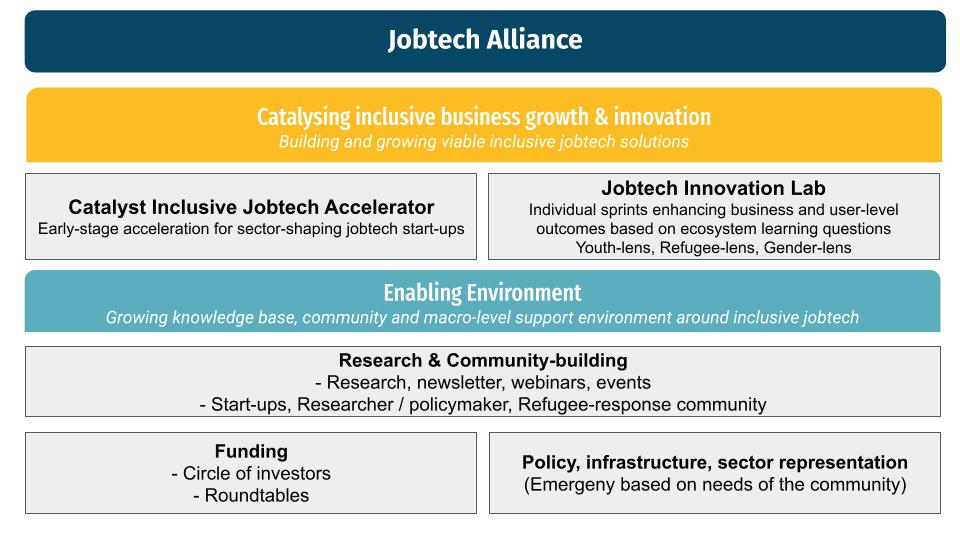By Chris Maclay and Michelle Hassan
In last month’s post, Chris talked about his 2 year-old son, Callum, and his first year of shouting. A critical skill in the first year of life, but that’s increasingly not enough (and ‘not cool’) in toddler years. Likewise, he explained, after a year of doing ‘everything that we could do for free’ in the Jobtech Alliance, and gathering information from the jobtech community in Africa, we are due to move from shouting to more intentional ecosystem-building activities. This article explains what, based on a year of learning, to expect from the Jobtech Alliance over the next year.
Just as a reminder, the Jobtech Alliance is an ecosystem-building initiative around inclusive jobtech in Africa. We’re using a systems change methodology called Collective Impact. Overall, we care about making jobtech: We care about jobtech of all sorts (check out our taxonomy here) and are interested in how jobtech can transform labour markets and make them more inclusive. We’re particularly interested in how they can reduce barriers to work for traditionally marginalized groups such as youth, women, and refugees (who have proven to be disproportionate users of jobtech across the world). |
We’re excited to introduce BFA Global, who have joined the Jobtech Alliance backbone, bringing both their venture building prowess and sectoral expertise in jobtech (having led the iWorker project, the Catalyst Inclusive Digital Commerce Accelerator, and other initiatives like iHuzo).
Who are BFA Global and the Catalyst Fund?
BFA Global has been running accelerator programmes for nearly a decade, supporting start-ups developing fintech jobtech and digital commerce solutions for underserved communities in emerging markets. BFA’s flagship accelerator, the Catalyst Fund (a $28m facility originally backed by the Bill and Melinda Gates Foundation and JPMorgan Chase, then UK Aid, Mastercard Foundation and Paypal), supports inclusive tech startups with capital and hands-on venture building support, access to networks of investors, and a large alumni base of startups across 15 emerging markets. To date, Catalyst Fund has backed 61 startups, which raised $446m+ in follow-on funding, have a survival rate of >88%, and have reached 14m+ underserved consumers.
Our revised strategy involves two major workstreams: the first involves improving the enabling environment for inclusive jobtech platforms to be successful and impactful scalable businesses. This is about improving the conditions (knowledge, funding access, policy) that make it more likely for quality platforms to thrive and create jobs on the continent. The second workstream involves putting our hands into the ecosystem to drive forward innovation and job creation by high potential platforms. We’d always ensure that any of our work with a single platform benefits the rest of the ecosystem through sharing learning and support to replicate.
If you work in pictures rather than words, and can’t stand the idea of yet more baby milestone analogies, here’s what to expect from the Jobtech Alliance in one graphic:

If you are into baby analogies, however… you’re in luck! Chris’s son is sick and Michelle has a 4-month old daughter, so we haven’t slept for days and are all out of creativity: let’s keep playing this analogy to explain what to expect from the Jobtech Alliance over the following year:
Workstream 1: Enabling Environment
Key baby developmental milestones age 1-2:
– Imitates speech of others, “echoes” word back
– Copies others, especially adults and older children
– Is more aware of themselves as separate from others
– Find things even when they’re hidden under two or three layers
The Jobtech Alliance seeks to enhance the conditions which enable jobtech platforms to thrive from a business and impact perspective. This means:
- Building transparency and understanding of the sector: We’ll continue a fair bit of shouting – building understanding of the sector at-large. This means updating our mapping on an ongoing basis, launching landscape studies (due by EOY 22) outlining key themes and actors, and beginning the process of formalizing Jobtech Alliance membership for start-ups (and inviting folks to join!) over the next few months.
- Research and market insights: We’ll be doing more research and write-ups on topics critical to start-ups and other actors in the jobtech space. This means more operational write-ups of ‘lessons learned the hard way’ (like this one just featured on the Flip newsletter), as well as more exploratory research on emerging topics. Critically, we don’t want to be the ones ‘doing all the work’, so we’ll be sharing content with others, and helping to steer research to best fit the needs of start-ups.
- Tools and resources: Further to the above, we’ll develop resources of use to actors in the jobtech space. We’re working with the ILO and the Dutch Challenge Fund for Youth Employment (among others) to develop a scorecard for quality of work in jobtech, and we’re exploring the development of a repository of open-source tools and resources (think: learning content for users, code bases or widgets) which are useful to start-ups in the space.
- Community-building: We’ll be working hard to build the critical ‘connective tissue’ between actors in the ecosystem. With jobtech platforms at the centre of our ecosystem, we’ll be growing our engagement with start-up founders and leaders, such as Slack channels for sharing learning and resources. We’ll be hosting communities for researchers in the space, and for those with a particular interest in refugees (given the particular interest in jobtech for refugee populations). We’ll enhance outreach and engagement through socials and in-person meet-ups across the continent.

- Funding: We’ve recognised that funding is one of the main leverage points in the ecosystem, so we’re focusing on bringing more smart money into the sector. This not only means curating a circle of investors interested in the space, and showcasing pipeline to them, but hosting roundtables with the philanthropic sector to help donors better understand the space. Potentially some philanthropic pitch days. Who knows.

And more to come: We know that there will be policy issues to address, and infrastructure concerns for the ecosystem. But we want to be driven by emerging themes from the community, rather than starting with an agenda. So watch this space.
Workstream 2: Catalyzing Inclusive Business Growth & Innovation
Key baby developmental milestones age 1-2:
– Tries to use switches, knobs, or buttons on a toy
– Builds towers with four or more blocks.
– Able to run, pivot, and walk backwards
As outlined last month, we’ve been encouraged to dig deep into the ecosystem, and support platforms in the jobtech space to improve their businesses and scale/deepen their impact. That’s why BFA Global has joined the Jobtech Alliance backbone team, enabling us to provide critical venture building capacity to high potential jobtech platforms:
Based off this, we’ve outlined two workstreams which will be kicking off over the coming months:Catalyst Inclusive Jobtech Accelerator:
- BFA Global will be launching an accelerator for early-stage jobtech start-ups with high growth potential. Building on the experience of BFA Global’s Catalyst Fund model, the program will host 2 cohorts of 4 early-stage innovators building accessible and appropriate jobtech solutions which connect young people to livelihoods. The Catalyst Accelerator combines catalytic capital, bespoke venture-building support and connections to investors, talent networks and other ecosystem partners to accelerate companies toward product-market fit and scale. The Catalyst Inclusive Jobtech Accelerator also builds on significant research and field building in the jobtech space in Africa conducted by BFA Global, including the iWorker project and the Catalyst Inclusive Digital Commerce Accelerator in Ghana.

- Jobtech Innovation Lab: Mercy Corps and BFA Global will support at least 20 start-ups on individual sprints which lead to desired business- and user-level outcomes. Combining tailored venture building support, grant capital, and more, we’ll work with earlier and later-stage jobtech platforms to do things like: (a) Develop new products/services which create new jobs (b) Adapt existing services or operations, or bundle new services to better serve marginalised populations (c) Support market expansion, particularly ‘tougher’ markets in the Sahel and Horn of Africa. This includes a focus on increasing access and employment outcomes for refugees through jobtech in Uganda (with support from a private foundation).
Just as a heads up, our funding for accelerator and venture building activities only allow us to work across Burkina Faso, Ethiopia, Kenya, Mali, Niger, Nigeria, Senegal, South Sudan, Sudan and Uganda, but our wider community-building activities continue to work across the whole continent (and we’re actively pursuing funding that enables us to work elsewhere too!).
Getting involved
We’re aiming to create and improve one million jobs through our members over the coming decade. The purpose of this blog is to not just to signal the future of our work, but to invite you to get involved. Over the next month or two, we’ll open channels for start-ups to express interest in our venture building support. We’ll also begin reaching out to the community to invite platforms to join as formal members of the Alliance. Please remember, that the Jobtech Alliance continues to be guided by a Steering Group of sector experts on the continent, but if you have ideas about what we should do, please get in touch here.
We’re grateful to the Dutch Challenge Fund for Youth Employment and another private donor for funding the activities that we’ve outlined above.
Let’s do this.


Very informative